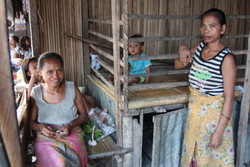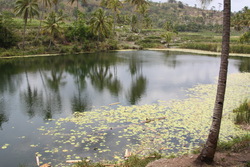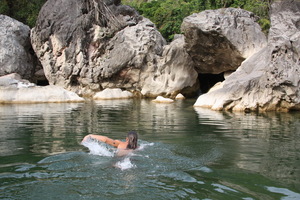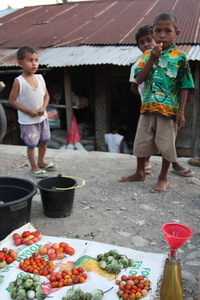Timor Leste 15 January 2009. There were bats. Lots of bats.
At first all I could hear was a dull chattering, but as we rounded a corner, the cave opened up into a space the size of a house, full of squealing and squawking. I couldn’t see them at first, but they were unsettled and flapping their wings. They seemed to be aiming for our torch lights.
 |
One came screaming towards me and kamikazed itself straight at my chest. Another went shrieking over my head. We can’t stop here, I thought to myself, so we ducked and dived our way out of the bat cave and carried on with our tour.
We were inside a limestone cave formation. The Timorese named it Leki Raka, which means “Place of Monkeys”, but there were only bats. The guide led our crew – two foreigners and two locals – deep beneath the crest of a hill.
Apart from a few names crudely scrawled on the walls, Nature’s hand had been at work for thousands of years creating incredible shapes and contours. Some rocks looked like the pipes of an organ, others hung from the ceiling like huge frozen rain drops.
We walked and crawled and slipped and slid over and under masses of limestone. I was with Aussie Tony Rickard, a partner in the hotel where I was staying. Our guide didn’t say a word, but without him we had no chance of making it back to the surface.
This was the last of my mini-adventures in Viqueque, a district in south-eastern East Timor, about 100 miles from Dili, the nation’s capital. As we found sunlight once more, I felt that sense of fulfilment that only comes when you travel somewhere fantastic that most people have never heard of.
The journey had begun in Dili. Tony picked me up in his Mitsubishi Pajero and we were on the road to Viqueque. Village Hotels Timor Leste is a cosy property in the beautiful Timorese countryside in a village in Viqueque called Loi Hunu, Ossu sub-district. “It’s a community-based project. The land and the property are owned by one of the villagers and his people help run it.”
 |
We drove east from Dili, skirting along Timor’s north coast. Part of the fun of going anywhere in Timor is the travelling itself. In a heartbeat the scenery changed. The barren hills of Dili, slashed and burned by the locals, made way for deserted Dollar Beach, a stunning white-sand spot where kids used to charge a buck to go. A family feud put an end to that custom.
We passed huge dry rivers and areas that looked like desert. Then we were snaking through thick forest. Next there were grassy hills as far as I could see, with towering cliffs dominating the horizon.
For lunch we stopped at a town called Vemasse. We had our pick of 10 identical restaurants – small wooden shacks all serving katupa, a type of rice with coconut milk and spices wrapped and steamed in strips of coconut leaves. “As soon as one family does something, like opening a restaurant, every other family does the same thing,” said Tony.
 |
Back on the road again and we drove across to Baucau, an edgy little town where the locals rarely smile at foreigners. We turned south and headed into mainland Timor towards the coast. The road deteriorated the farther we were from Dili. At times our path was littered with potholes almost as wide as the road itself. It was a bumpy ride, but it was fun.
About four and a half hours later we were in Ossu, in the northern part of Viqueque. We pulled up to Village Hotels Timor Leste. The peach building looked more like a house than a hotel. The hotel had seven rooms; four with bathrooms en suite and three with shared facilities. The rooms were clean, the linen was fresh and it felt like home. I walked through the dining area and out to the veranda. I was in the middle of nowhere with great cliffs all around.
Soon we were back on the road, heading to Viqueque, the capital city of the district of the same name. I’d asked to be taken to a cockfight and so Tony, Ameo, Jose and I went in search of a rumble.
 |
Cockfighting is as much a part of Timorese culture as dancing or tais and it goes on all over the country. The Timorese treat their fighting cocks like kings, training them to be vicious battle-worthy machines. We arrived in the city of Viqueque late-afternoon. The monument where the fights normally happen was quiet so we took a stroll through the market.
After sinking a few cans of beer we began asking around if there were any fights on. We got word of something happening near the cemetery, so we hopped back in the Pajero and cruised up the road. There it was, a fenced squared circle surrounded by 100 men and boys with their gazes locked onto the action.
A scrap was just beginning. Two men were stood in the cockpit holding their warriors beak to beak a couple of feet off the ground. Each combatant, one black and one white, had a blade in its claws.
The birds were angry. Money was frantically changing hands.
The animals were released and the handlers made a swift exit while the cocks sized each other up, their feathers puffed out in the attack pose.
Red in tooth and claw.It was a game of tactics, with neither fighter making a move. The black one jumped at the white, crashing down on his foe and sending a fountain of feathers into the air. The war was over.
It was a game of tactics, with neither fighter making a move. The black one jumped at the white, crashing down on his foe and sending a fountain of feathers into the air. The war was over.
There was no blood and the defeated brawler hadn’t actually been killed, but there a great deal of inspecting going on around the fallen rooster. There were more fights before it became too dark even for those fierce soldiers.
We went back to the hotel. After dinner I walked out onto the veranda and picked up a book – The Last Continent by Edmund Cooper. I opened the cover and saw a tag with a stamp that read, “Murray High Library Queenstown. Date due: 14 May 1985.” Two thousands years from now, the earth is inhabited by white savages and a black superior race lives on Mars. It was time to sleep.
The next morning I looked at my bag and found a scorpion. It was only about two inches long, but I spent several minutes staring at it and wondering if it could kill me. I picked up my bag and flicked the critter out the window. After all, there was a busy day ahead – a day of swimming.
 |
We were going to the hot springs of Venilale, about 35km north of the hotel. After being thrown around in the Pajero for an hour, we found our springs in the wilderness and jumped straight in. An old lady and a few children were bathing in the knee-deep pool, but otherwise we had the place to ourselves.
After soaking in the pungent water, we drove through the jungle as hordes of school children screamed at us on their way home. We picked up some hitchhikers. About 10 of them squeezed into the boot of the Pajero. As we started moving again I turned around and saw an old man hanging off the back door on the outside. “All right let him in,” said Tony.
On the return trip we passed tunnels that had been carved out of an embankment by the Japanese during the Second World War. They only went back a few metres and weren’t as impressive as the limestone caves, but it was easy to imagine a troop of Japanese soldiers digging away.
After dinner I sat out on the veranda with Tony and talked shop over a few beers. The hotel is a work in progress. At the moment its power comes from a generator and a hydro system that needs a bit of fine tuning. “We’re going to have the whole place running off hydro and solar power,” said Tony.
 |
Out on the front lawn there were the beginnings of a hut with another being built round the back. The two new rooms will have composting toilets and bathrooms en suite.
But this is just the beginning. A second hotel is going to be built in south-western Timor in Rotuto on the border between Manufahi and Ainaro districts. More hotels will follow to form the stopping points on a nationwide tour of East Timor. These are big plans for a country where tourism has a long way to go before it can be called an industry.
Retiring to the veranda once more alone, I returned to my friend Edmund Cooper and read about his vision of the fate of Earth and mankind’s destructive nature. I thought if that’s what is in store for our planet then I want to see as many places like Viqueque as I can.
I slept easy in the cool night with a head full of ideas for what might lie ahead for Timor. Occasionally I was roused by the Jurassic Park-like noises coming from outside. The next day would be my trip to the monkey caves where the bats live and after that would be the long drive back to Dili. I didn’t want to leave.
Photography by Matt Crook.
Contact Village Hotels Timor Leste via email villagehotelstl@gmail.com or call the Dili office at +670-331-0616.

